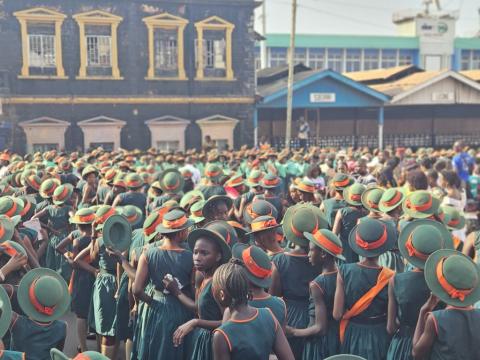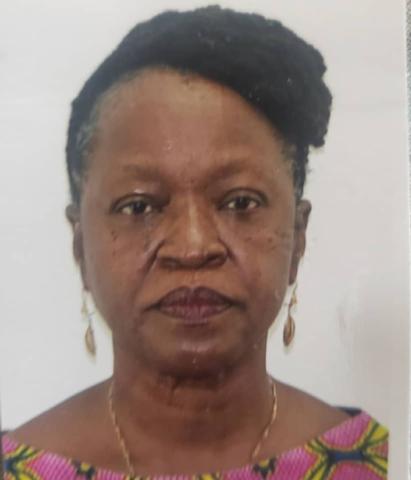The historic Annie Walsh Memorial School held its march past on Sunday 17 March to climax celebrations marking its 175th anniversary. Controversy had surrounded the enforcement of a dress code for old girls who wished to attend the occasion. Dr Hussainatu Abdullah, an old girl who attended the school in the 1970s, disagrees with the measures.
Happy 175th birthday to the Annie Walsh Memorial School (AWMS), the first girls' secondary school in sub-Saharan Africa. Hip, hip, hip, hurrah! Hip, hip, hip, hurrah!! Hip, hip, hip, hurrah!!!
Like all other alumni, I am proud to have been a part, however small, of the story of AWMS and grateful to witness its 175th anniversary. 175 years in the life of any institution is a major achievement for which a fulsome
celebration is justified. When the institution has left indelible marks in the sands of time as AWMS has done, it is even more reason to mark the anniversary with all the pomp and circumstance that can be mustered.
Celebrating the AWMS milestone naturally invites a justified focus on our many achievements and successes. The school's contributions to national development and the personal advancement of all who passed through its walls are immeasurable. For me, the school’s motto, “Not for Self but for All”, was to become a guiding principle that has remained with me over the years.
Indeed, that motto influenced my choice of a course of study at the university. I opted to major in Sociology because of the resonance of concepts such as inclusion, diversity, equality, ethnicity, racism, and social stratification that I learnt in my first year with the motto of my Alma mater. For in that motto, and the rallying call it embodies, was a message of social transformation anchored on a commitment to justice and solidarity in which no one is left out or left behind.
Everyone who passed through AWMS has a particular value or set of values that impacted us the most as we progressed in life. As we celebrate our 175th anniversary, it is important to recall that we AWOGANs were always socialised to strive to bring everyone into the fold and not try to discriminate against or exclude anyone based, for example, on a divisive or exclusionary implementation of a dress code. There have been whispers in the corridors about AWOGA's dress code for our annual Thanksgiving Service. However, I am only addressing it now because I took it as hearsay until I saw it in print for the first time.
Before addressing the specifics of the dress code, I want to state categorically that all AWOGANs, irrespective of our faiths, know that the AWMS was founded by the Christian Missionary Society (CMS) and is headed by the Bishop of the Anglican Diocese of Freetown and Makeni. In their wisdom, the school's CMS founders saw the need for diversity and, therefore, opened the institution up to the Muslim community in 1896, forty-seven years after its founding. Kiptiatu Agnes George, an
Aku girl from the Fourah Bay community, was admitted to the school. Four generations of women in her family have attended the AWMS. Had her great-granddaughters not emigrated from Sierra Leone, the fifth generation of her family would likely have attended their great-great-grandmother’s Alma mater, and they would be nurturing the sixth generation to take over the baton from them. One of Kiptiatu George's granddaughters, Raila Rahman, taught at AWMS and was even a vice principal.
Having said this, we should not conflate AWMS and AWOGA. AWOGA is an independent organisation created by former AWMS students to foster a sense of community among the alumni whilst promoting the school's ideals and supporting its development. Although I have not seen the Articles of Association of AWOGA, I have good reason to believe that they do not contain any articles or clauses that can be deemed discriminatory; if they did, Muslim alumni would have responded earlier. While I agree that there should be a dress code to ensure everyone is attired appropriately for the Thanksgiving Service, AWOGA's dress code of a plain white dress (just below the knees) and straw hat is not inclusive.
Firstly, I am troubled by AWOGA's definition of a dress, as it excludes maxi-length outfits. The definition of a dress that has been adopted does not fit the Oxford dictionary's definition of a dress as "a piece of women's clothing that is made in one piece and covers the body down to the legs sometimes reaching to below the knees, or to the ankles".
Also, the insistence that every AWOGAN should wear a straw hat or boater to complete their outfits is worrisome. This is because the current dress code being pushed by AWOGA is discriminatory, restrictive, and retrogressive. Adopting the dress code used in the 1970s and 1980s would be much better.
For example, my mother, a Haja and practising Muslim in her lifetime, regularly participated in the annual Thanksgiving Service. She wore her white lace or brocade (brillian) gown, black shoes, and purse and wrapped the school hat band around her head scarf. She was never told that she violated the school's dress code and thus could not march. On the contrary, she was warmly welcomed and marched proudly with her fellow AWOGANS of the decade of the 1940s.
Also, Fatmata Hassan-King, the first female Income Tax Commissioner and Maimunata Nicol, a former Secretary of AWOGA, marched with their full Muslim regalia of a long dress and headscarf with their school hat bands. So, to discriminate against Muslim women who started attending AWMS in 1896 is grossly unfair!
As we celebrate AWMS's 175 years of existence, I would like AWOGA officials to rethink this rule and expand the space for participation, not shrink it, by embracing AWMS's progressive record and history of including Muslim girls and any other women who, for one reason or another, are uncomfortable with the narrow definition of a dress that has been adopted.
AWOGA should apply the simple Oxford dictionary's definition of a dress to embrace and bring in women who currently feel left out of the fold. This piece advocates not only for the rights of AWOGA Muslim women but also for women who have adopted 'age-appropriate' outfits such as gowns, long skirt suits, and ducket and lappa for comfort. AWOGA should focus on bringing us all together in a spirit of love, respect, modesty, and humility whenever we assemble to celebrate the first girls' secondary school in sub-Saharan Africa. Non-Sibi Sed Omnibus!
Hussainatu Jummai Abdullah holds a PhD in Sociology and Sociology Anthropology from University of Hull, UK. She's an independent researcher and consultant on Gender and Development. She attended the Annie Walsh from 1973-1979.
Copyright (c) 2024 Politico









